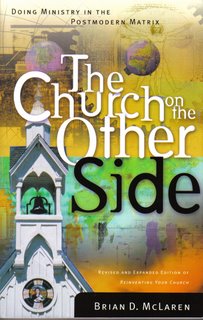The Church on the Other Side

The intention of Mclaren’s book “The church on the other Side” can be captured by the evaluation questions he provides in Strategy Three “Practicing Systems thinking.” In essence this book calls leaders and churches to evaluate their current systems in light of a cultural shift being called postmodernity. This evaluation is captured in four questions he proposes for evaluating our church systems. Does this help uncommitted people become followers of Jesus? Does this help followers of Jesus become better followers of Jesus” Does this enhance the development of authentic Christian Community? Does this empower, equip, deploy the church for missional identity for the good of the world?[1] Every topic and issue presented in this book is concerned with wrestling with one or more of those questions.
In many instances I recalled what Mclaren was saying from other authors I have read. I should note that in each instance he seemed to be adding a new spin to the conventional understanding. One example of this was his chapter on structure in Strategy Eight. I had found most of what Mclaren had to say in a book by Gary McIntosh called “One size Doesn’t Fit all.” However, Mclaren’s final analysis describing the best structure as ones flexible enough to become a better structure tomorrow was a powerful observation[2].
The structure of this book seemed to be inviting churches to consider and evaluate the other side (postmodernity). As a leader I did not feel like Mclaren was seeking to convince or convert me to postmodernism. Instead, the challenges of doing ministry in today’s culture were discussed and described. Mclaren’s concern and compassion for the church are evident in his kind and open approach. I appreciated the wide scope of suggestions he gave for the possible solutions to any given problem. A great example of this can be found in Stragety Six “A new Apologetic.” After dismantling much of the old apologetic he provides several approaches to the contemporary issues of relativism and pluralism.
I found most of Mclaren’s observations to be a solid and balanced approach to the issue. However, in his chapter on Postmodernism Strategy Twelve A he seemed compelled to present only the bright and optimistic side. This seemed to be a break in form, and made it seem for the first time that he was trying to convince me of the goodness of postmodernity. I want to push back on two of his five core values of postmodernity. Mclaren claims that postmodernity is sensitive to context. Simply because most people in the emerging culture appreciate individualism and autonomy of faith does not mean they have a greater understanding of social and historical context. Mclaren claims Postmodernity leans towards the humorous. In my observation the culture is move towards not away from seriousness, hopelessness, and depression. I have personally meet more people in the emerging culture who are disgruntled and lonely than humorous. I am not suggesting he is completely wrong, but that I would question context and humor as core values of the world on the other side. McLaren has given the church and its leaders a great gift in writing this book. It is not a book of answers, but great questions. Along with asking great questions about mission, apologetics, theology, and our systems he provides a variety of possible answers. I was challenge to think of how the new structure and systems these questions had created could be open to change and improvement tomorrow. Similar to trading

0 Comments:
Post a Comment
Subscribe to Post Comments [Atom]
<< Home